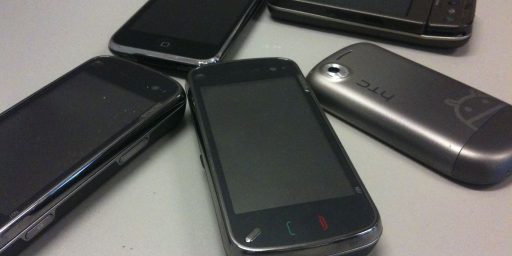Smartphone: From Gadget to Necessity?
Via Twitter (@MelissaTweets and @Armano) I see a week-old NYT piece from Steve Lohr titled “Smartphone Rises Fast From Gadget to Necessity.”
For a growing swath of the population, the social expectation is that one is nearly always connected and reachable almost instantly via e-mail. The smartphone, analysts say, is the instrument of that connectedness — and thus worth the cost, both as a communications tool and as a status symbol.
“The social norm is that you should respond within a couple of hours, if not immediately,” said David E. Meyer, a professor of psychology at the University of Michigan. “If you don’t, it is assumed you are out to lunch mentally, out of it socially, or don’t like the person who sent the e-mail.”
The spread of those social assumptions may signal a technological crossover that echoes the proliferation of e-mail itself more than a decade ago. At some point in the early 1990s, it became socially unacceptable — at least for many people — to not have an e-mail address.
I’ve had a BlackBerry for a couple of years now and have been a quick-turnaround responder to emails for a decade or so. (The rise of spam, into which category I place most pitches by PR firms and others seeking to have me blog on their topics has diminished my response rate considerably. I do, however, tend to respond quite quickly to “real” emails received between, say, 7 am and 9 pm Eastern that seem to call for a response.) Being able to keep up with my communications without being tied to my desk has been invaluable and I far prefer the asynchronicity of email to the interruption of telephone calls.
The social — and, increasingly, professional — expectation of being constantly available, however, is much more bane than boon. I’m generally more than happy to take a couple minutes out of my evening or weekend to help someone out with a quick question so they can continue progress on whatever they’re doing without waiting until 9 am the next workday. But, for many people, it has become more than that: a culture where one is never truly off work. While I have no idea what to do about it, that’s not a positive development.
UPDATE: Melissa Clouthier observes,
Moms are never off the clock. And there’s always a kid interrupting, bugging, and harrying the mother during her tasks. I’ve breastfed. The smart phone has got nothing on a 3 month old.
With smart phones, we’re all mothers now.
Of course, the smart phone is in addition to life’s normal demands. The fact that the baby’s crying because her teeth are coming in doesn’t stop the emails from coming in.






I’m not sure when I would have jumped for a web-capable phone, maybe when Android came out, but I got an iPhone as a gift … it’s one of those things where once you have it you can’t go back.
To always have maps in your pocket, to have stock quotes, to be able to double-check some claim you just made on wikipedia … going back off line and out of the loop would be hard.
I have a WordPress app that will blog from anywhere, even half-way up a trail. Not really necessary, but again it’s hard to give up that kind of connectivity once you have it.
I’ve had a Palm for some years now. It’s helped in many areas of my life.. the blog has become far more current, since I can be alerted about anything I decide to put a crawler alert to, but also because my online freinds can contact me on a whim.
Similarly, my ability to clients to contact me has helped in the business world, as well. You’re quite right, that one is really never diconnected, anymore. But in the world of the IT contractor, that’s the way of it anyway. These things would not be of much professional use, after all, for a 9 to 5 ‘er working an assembly line. This is simply the nature of the job.
That’s a negative of itself, but to the extent that it’s kept me connected to my less than business activities, it’s a boon… so on balance, it’s neither a negative or a positive.
Having a browser to hand wherever I am is a real boon; Someone once said it’s not what you know, it’s if you can look it up. With this thing on my hip, I can look up whatever I’ve a need to, wherever I may be. That helps in business situations, without question.
In a purely personal sense, though, I do use the scheduling to keep me on time, and I carry perhaps a couple hundred books of varios natures in the thing… and as such I’m far better read than I used to be. I sneak reading into spare moments. Far easier to whip out the Palm than to carry a few hundred… or even one… book with me. It’s my MP3 player, as well, and will handle internet audio streams rather well, so it’s kinda like an XM reciver. I often have it playing Smooth Jazz.com or something of the sort on my desk here at work, for example, and in the car.
So with that in the mix, it’s a fair positive.
In many (though of course not all) professions there’s certainly an expectation that you respond within a few hours to either email or phone messages.
But I’m not sure that true socially. In fact, at least where I live, people talk about not having a Pavlovian response to a telephone or email – the whole point of email and voice mail is that they can be examined at leisure.
My expectations depend on the nature of the e-mail. If I’m trying to set a time for a meeting among colleagues, then I expect an answer within hours.
If I’m making a simple request to a staff member, like “What form do I need to do XYZ?”, then I expect an answer within 24 hours.
If I’m asking for actual work, like “Please prepare a budget for ABC”, then 3-4 business days. If it will take longer than that, then I expect some reply letting me know.
I’m usually fine with people taking longer, and understand why some people are annoyed when people send up follow-up e-mails. If someone takes longer than I expect, my natural inclination is to just assume that they are momentarily busier than normal, and will get to it soon.
However, I’ve found that there is a countervailing factor to just assuming that e-mails are in the inbox, and that is that some people simply don’t respond to a certain percentage of e-mails. So, for example, if I wait a week for a simple informational request, I may find out eventually that the person had no intention of responding, perhaps because they didn’t know the answer, or they just didn’t feel like it, or they just simply assume that if they don’t get multiple reminders about something, that the person was not that interested in getting a reply in the first place. (Yes, there are people like that.)
That’s part of the reason I don’t have a smart phone. Well, that and the cost. But when I’m away from my computer, I’m away from my computer. That’s part of the reason why, at my last job, I never started the IM feature that the company added. People would say “Now we can contact you anytime, anywhere.” My response was that I saw that as a bug, not a feature.
I’m actually concerned that people feel that they cannot be plugged in all the time. Someone actually answered his cell phone during the sermon at my church a few months ago. Okay, the answering I could see-in an emergency- but he actually carried on a conversation. And a co-worker was giving me a ride to the airport last month and he received and replied to several text messages. While driving. The idea that he shouldn’t immediately respond seemed just wrong to him.